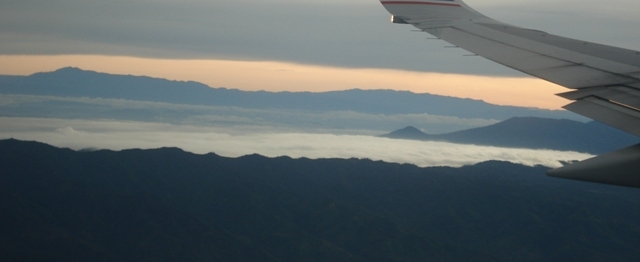HOLLYWOOD—A comic-book yellow BMW bounded through the American night. Denny’s and Shell gas stations signs shined against a horizon of dark purple rainclouds. Candelaria’s eyes sparkled, taking it all in. She felt an enormous weight off, a giant fist from the sky that bore down on her soul now lifted, as the yellow coupe with a mirror polish raced northbound on I-5. It started to rain.
In the back seat were Candelaria and a young boy; at the wheel, Don Ignacio’s son-in-law, Mario, who’d hopped into a dirty pair of jeans and zipped down the I-5 to San Diego to meet them.
Maria, Don Ignacio’s daughter, had stayed home to care for the twins. The twins were the reason for the longing of Doña Rosa, who’d perished on the immigrant trail in Arizona, her longing to come to the land of Velveeta and money, namely to hug the grandchildren and pamper them. One of the twins, Antonio, his father’s little shadow bawled if he couldn’t go. So he came too.
“You don’t know how many times we came from our rancho to apply for a visa at the Consulate in Guadalajara,” Don Ignacio was saying in the front passenger seat. “Three times. It cost us two eyes from our heads. I am a simple man; I don’t understand all the papers and the senseless questions. And the phone number you’d call for information—they charged you by the minute as you sat on hold listening to music that put you to sleep. Oh, the gringos are so smart! They can’t take a step without hearing the cash-register ring.”
Candelaria saw Don Ignacio smile for the first time since Doña Rosa had perished in the desert. Suddenly, as if he felt guilt for this lightness of feeling, he assumed a somber tone.
“The trip was very hard for Rosa, but she was so happy to be seeing the grandchildren.”
“It’s O.K.,” said Mario.
“At the end her eyes said a final thing: ‘Nacho, why did we make this trip. Why?’ I’ll carry that look to my grave.”
“It’s O.K.,” Mario repeated to his father-in-law. “We’ll say a novena for Doňa Rosa at San Anselmo. And soon I’ll get you signed up to receive social security. You’ll see; you’ll be set. You’ll be so happy you’ll never want to go back to Mexico.”Don Ignacio closed his eyes. A smile reappeared on his creased face.
“It’s good you called when you did,” said Mario. He was fair-skinned and handsome in a telenovela sort of way. The one working windshield wiper kept pushing the raindrops off the glass. “A man was coming with cash for the BMW. Another ten minutes and we wouldn’t have had a car to pick you up. As it was, we sold him the Play Station to get gasoline.” He turned his profile to Candelaria. “Do you have family in the Norte?”
“One brother,” she said. “But I lost his phone number.”
“I see,” said Mario.
Del Mar. La Jolla. Carlsbad. Oceanside. On they sped. Free at last. The radio blared banda and ranchera. Amid a dark landscape crouched Camp Pendleton—a no man’s land of military games—and the mammalian mounds of the San Onofre nuclear reactors, just ahead of them the cars’ brake lights flashed and suddenly halted.
Under lights bright as stage lights that leave the audience drowned in darkness, there were uniformed men and bloodhounds on leashes roving between the lines of cars. Candelaria awoke from a pleasant, half-asleep reverie as she hugged slumbering Antonio in the back seat.
Mario cracked down the window.
“Your papers, please,” said the officer.
In that instant Candelaria imagined being flown back to El Salvador in chains, humiliated. She knew in her heart: if she had to, she would come back on foot. She knew it and the thought filled her with indomitable strength.
She pressed down her top teeth into her roseate lower lip till she tasted blood. Mario cracked down the window. Candelaria stared at the back of his buzz cut neck. The officer peered down and flashed a tiny flashlight into the BMW’s rear. He was wearing the same drab green uniform as the man they saw through the basement window of their dungeon in Chula Vista. The one who drove the monster Ram pick-up.
“Your papers.” the officer said.
Mario reached down, and his foot had an urge to press on the gas. He knew what would happen if Candelaria and Don Ignacio were found to have no papers—straight to jail, his father-in-law deported.






